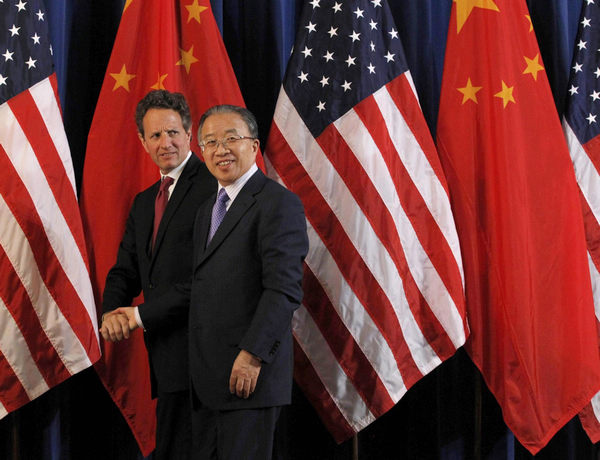-
News >China
Nations find way to cool Asia-Pacific issues
2011-05-12 07:16
State Councilor Dai Bingguo shakes hands with US Treasury Secretary Timothy Geithner after they both made closing statements at the end of the China-US Strategic and Economic Dialogue at the Department of the Interior in Washington on Tuesday. [Photo/Agencies]WASHINGTON - China and the United States agreed on Tuesday to establish a bilateral consultation mechanism for the Asia-Pacific region after an eventful year during which frictions in the area stagnated bilateral ties several times.
The new mechanism was hammered out as the two countries concluded their two-day Strategic and Economic Dialogue (S&ED) in Washington.
Senior officials from the Foreign Ministry and the US State Department will hold the first round of these new meetings as soon as possible this year, which will set the detailed plan for the mechanism, said Vice-Minister of Foreign Affairs Zhang Zhijun, who attended the dialogue.
"It would be inappropriate for China and the US to talk about cooperation at the global level without cooperation in the Asia-Pacific region," Zhang said at a press briefing during the dialogue.
The third round of the S&ED, the highest level of discussions between the two countries, touched on a wide range of topics, including regional and international security issues and concluded with several decisions made to enhance strategic trust.
The newly pledged consultation mechanism on Asia-Pacific regional affairs has been hailed as one of the most concrete achievements to emerge from the dialogue because the two countries have experienced setbacks in recent years due to spats on such issues.
Along with China's growing political and economic influence in the Asia-Pacific region, the Obama administration has adopted a "back-to-Asia" policy to try to regain its dominance in the region.
Tensions have risen during the past two years between Washington and Beijing.
In one instance, US Secretary of State Hillary Clinton announced in Hanoi, Vietnam, in July that the US has a "national interest" in the South China Sea.
This week, Clinton said the region is "where we (the US and China) share a wide range of common interests and challenges".
"We agreed that the Asia Pacific is broad enough to accommodate the interests of China and the United States," State Councilor Dai Bingguo, who chaired the strategic track of the S&ED, said in his closing remarks.
"We must work together in this region, work together with other countries in this region to uphold peace and stability."
During the dialogue, the US reaffirmed that it respects China's interests, welcomes a strong, successful and prosperous China that plays a greater role in international affairs, and does not seek to contain China. Beijing reaffirmed its commitment to the road of peaceful development and said it will not challenge US interests, according to Dai.
Analysts said the new regional consultation mechanism will help the two countries boost confidence in handling this complex bilateral relationship.
Bonnie Glaser, a security expert with the Freeman Chair in China Studies at the Center for Strategic and International Studies, said the new consultation on Asia-Pacific affairs fills a gap in bilateral exchanges on regional issues.
"The US and China have had sub-dialogues about virtually every region of the world, including Africa, Latin America and the Middle East but we have not had a sub-dialogue on the Asia-Pacific," she told China Daily.
She said many Chinese people have the perception that the US is seeking to drive a wedge between China and its neighbors, while the US and other nations are concerned about China's assertive behavior in the region.
Such consultation is needed to "assuage suspicion and build greater confidence," she said.
According to Niu Xinchun, a US studies specialist at the China Institutes of Contemporary International Relations, it is unrealistic to hope that the regional affairs consultation mechanism will settle all bilateral disputes in the region at once.
The most urgent task for the mechanism will be to set up a crisis management function that will help contain minor frictions and stop them from escalating and derailing bilateral ties, said Niu.
